Reviews
Roger Corman
USA, 1964
Credits
Review by Michael Nordine
Posted on 22 June 2011
Source Netflix Instant
Related articles
Reviews
The Masque of the Red Death by Leo
Categories Vincent Price
What passes for my first cinematic experience with “The Masque of the Red Death” came in my sophomore year of high school. I was in history class and for one reason or another - a section of our textbook devoted to the bubonic plague, perhaps - my teacher had procured an audiobook version of Edgar Allan Poe’s short story set to a corresponding slideshow. A man whose voice rivaled the ominousness of Vincent Price’s narrated the story and, every few paragraphs or so, indicated when to move on to the next slide. The effect was compelling in that it created a sort of middle ground between conjuring up one’s own images while reading the story and watching a film that captures them all, as is the case with Roger Corman’s The Masque of the Red Death. The penultimate entry in a series of eight Poe adaptations released over four prolific years, Corman’s film is somehow disappointing after having first been exposed to the slideshow. I’d like to think there’s no such thing as an unfilmable book, but there’s also an inherent danger in filling in all the gaps of a story whose power lies in its omissions.
Vincent Price, who collaborated with Corman on six of his seven previous Poe adaptations, stars as the otherworldly Prince Prospero. He establishes his character’s eccentric sadism in the first scene, when he forces a young woman named Francesca to save either her father or her lover from being garroted, a sentence he imposed on the two men moments earlier. He does so not out of mercy but because he seeks a particular brand of entertainment: human suffering. Much of what follows is every bit as sadistic - and, given Prospero’s satanic leanings, chthonic - as this opening episode. The Masque of the Red Death is an exceptionally dark film, and one that descends into camp less frequently than most films of its ilk. When Price laughs ominously here, it’s with a restraint not always present in his performances, and Corman, in relying on the palpable unease arising from the omnipresence of the Red Death rather than trickery or overt gruesomeness, takes a similarly restrained approach.
There’s something self-evident about the terror elicited by the film’s titular disease, and it’s deepened by how little is actually known about it. The Red Death’s infectiousness is certainly plague-like - and indeed that’s what its inspiration is most often identified as - but the fact that Poe’s wife was afflicted with tuberculosis at the time of his writing the story adds another layer to the intrigue. He describes the disease in the opening paragraph of his story:
No pestilence had ever been so fatal, or so hideous. Blood was its Avator and its seal—the redness and the horror of blood. There were sharp pains, and sudden dizziness, and then profuse bleeding at the pores… the whole seizure, progress and termination of the disease were the incidents of half an hour.
There’s also a sense of comeuppance to the affliction derived from the victims on whom Corman most fixates: the elite. The Masque of the Red Death takes place in the labyrinthine castle in which Prospero hosts a grand masquerade for his “friends,” and neither Poe in the original text nor Corman in bringing it to the screen offer much reason to sympathize with these characters. Mere miles away, a village burns; here in the castle, partygoers drink, dance, and delight in the misfortunes of others and each other. Perhaps the only sympathetic character is Francesca. The face of Christianity in the film, she’s diametrically opposed to the avowed Satanist who’s taken her captive. Religion is inextricably linked to The Masque of the Red Death’s setting and subject, and Corman shows two divergent reactions to one’s mortality: a deeper fear and reverence of one’s god and the renouncement of faith altogether.
Even if much of this film’s legwork is done by its inherently heavy subject matter, the speed and economy with which Corman made it (and, for that matter, most of the other 50 or so films he directed) impresses all the same. The Masque of the Red Death was one of three directorial efforts by Corman released in 1964; though obviously low-budget, it doesn’t bear the marks of having been cheap or rushed. Still, not all of its elements work: Corman adds a romantic subplot involving Francesca and her lover, as well as a much stranger one concerning a dwarf and a ballerina. These deviations from the masquerade at the heart of the story to be cumbersome, a necessary evil in stretching a very short story into a 90-minute film.
The masquerade itself is a cruel affair. The dwarf lights a man on fire, Prospero’s mistress commits suicide, and, at the sight of a cloaked figure whom Prospero takes to be Satan himself, the ball turns into a literal danse macabre. Prospero is delighted by all of this. “I beg you, do not mourn for Juliana,” he says after his mistress’s death. “She has just married a friend of mine.” He’s speaking, of course, of Satan, a declaration very much in keeping with the film’s occult set pieces: candles, incantations, inverted crosses. Most fascinating of these is a series of monochromatic rooms—an all-purple room leads to an all-yellow room, and so on—whose significance (in the film, at least) is mostly aesthetic. Prospero even forces two men into a game of proto-Russian Roulette involving five daggers, one of which is dipped in poison. The partygoers look on, their faces aglow with anticipatory excitement.
Prospero revels in the misery of others, and his schadenfreude proves infectious: “I no longer care,” Francesca says when asked why the sight of cruelty no longer bothers her. In jading her, however, Prospero seems to have taken the smallest of steps toward caring for another—an upturning of all his previous behavior. But the small change is ultimately too little, too late. Prospero meets his end unredeemed and missed by no one, helpless in the face of the only force more powerful than himself.
More Vincent Price
-
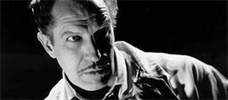
The Tingler
1959 -
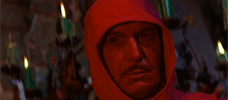
The Masque of the Red Death
1964 -

The Last Man on Earth
1964 -

The Tomb of Ligeia
1964 -

War-Gods of the Deep
1965 -
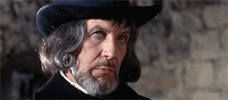
Witchfinder General
1968 -

More Dead Than Alive
1969 -

The Abominable Dr. Phibes
1971 -
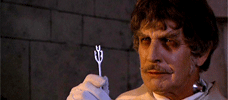
Dr. Phibes Rises Again!
1972 -
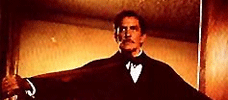
Theatre of Blood
1973
We don’t do comments anymore, but you may contact us here or find us on Twitter or Facebook.



